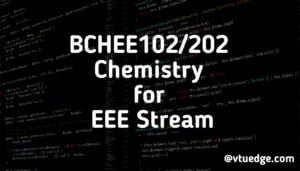
BCHEE102/202 Chemistry for EEE Stream
Syllabus Copy
Module - 1
ChemistryofElectronicMaterials
ConductorsandInsulators:Introduction,principlewithexamples. Semiconductors: Introduction, production of electronic grade silicon-Czochralski process(CZ) andFloatZone(FZ)methods. Polymers:Introduction,MolecularweightNumberaverage,Weightaverageandnumericalproblems.Conductingpolymers– synthesisandconductingmechanismofpolyacetylene.Preparation, propertiesandcommercialapplicationsofgrapheneoxide.
PCB
Electroless plating – Introduction, Electroless plating of copper in the manufacture ofdouble-sidedPCB. Self-learning:Technologicalimportanceofmetalfinishinganddistinctionbetween electroplatingandelectrolessplating.
Module - 2
EnergyConversionandStorage
Batteries: Introduction, classification of batteries. Components, construction, working andapplications of modern batteries; Na-ion battery, solid state battery (Li-polymer battery)andflowbattery(Vanadiumredoxflowbattery). FuelCells:Introduction,construction,workingandapplicationsofmethanol–oxygenand polymerelectrolytemembrane(PEM)fuelcell.
SolarEnergy
Introduction,importanceofsolarPVcell,constructionandworkingofsolarPVcell,a dvantagesanddisadvantages.
Selflearning:Electrodes for electro static double layer capacitors,pseudo capacitors ,and hybridcapacitor.
Module - 3
CorrosionScienceandE-wasteManagement
CorrosionChemistry:Introduction,electrochemicaltheoryofcorrosion,typesofcorrosiondifferentialmetalanddifferentialaeration.Corrosioncontrol-galvanization,anodization and sacrificial anode method. Corrosion Penetration Rate (CPR) – Introductionandnumerical problem.
E-waste Management
Introduction, sources, types, effects of e-waste on environment andhuman health, methods of disposal, advantages of recycling. Extraction of copper and goldfrome-waste. Self-learning:RecyclingofPCBandbatterycomponents
Module - 4
NanomaterialsandDisplaySystems
Nanomaterials: Introduction, size dependent properties of nanomaterials (Surface area,Catalytic, Conducting), preparation of nanomaterials by sol-gel and co-precipitation method with example.Introduction,propertiesandapplicationsNanofibers,Nanophotonics,Nanosensors.
DisplaySystems
Liquidcrystals(LC’s)-Introduction,classification,propertiesandapplication in Liquid Crystal Displays (LCD’s). Properties and application of Organic LightEmittingDiodes(OLED’s)andQuantumLightemittingdiodes(QLED’s). PerovskiteMaterials:Introduction,propertiesandapplicationsinoptoelectronicdevices.
Self-learning:Properties&electrochemicalapplicationsofcarbonnanotubesandgraphene.
Module - 5
SensorsinAnalyticalTechniques
Electrode System: Introduction, types of electrodes. Ion selective electrode – definition , construction, working and applications of glass electrode. Determination of pH using glasselectrode. Reference electrode- Introduction, calomel electrode– construction, workingand applicationsof calomelelectrode.Concentrationcell Definition , construction and Numerical problems.
Sensors
Introduction,workingprincipleandapplicationsofConductometricsensors,Electroch emicalsensors, Thermometricsensors, andOpticalsensors. AnalyticalTechniques:Introduction,principle and instrumentation of Colorimetricsensors; its application in the estimation of copper, principleandinstrumentationof Potentiometric sensors; principleandinstrumentationof its applicationin the estimation of iron, Conductometric sensors; its application in the estimation of weakacid.
Self-learning:IRandUV-Visiblespectroscopy.